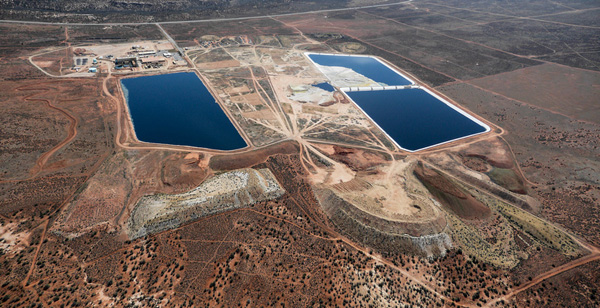SALT LAKE CITY, Utah — Grand Canyon Trust today sued Energy Fuels Resources in Utah federal district court over ongoing radon pollution problems at its White Mesa uranium mill near Blanding and White Mesa, Utah. The suit aims to correct ongoing problems at the mill and to ensure resources are available for cleanup and reclamation.
“Radiological pollution is dangerous and uranium mills must comply with laws lessening that danger,” said Anne Mariah Tapp, attorney with Grand Canyon Trust. “We want to eliminate or reduce the harms to public health and the environment resulting from radon emissions.”
White Mesa is the only conventional uranium mill operating today in the U.S. It processes ore from regional uranium mines, including near Grand Canyon. It also receives, processes, and disposes of radioactive waste, or “alternate feed,” from Superfund sites and other locations across the U.S. that are contaminated with radioactive waste.
The suit cites data showing that in 2012 and 2013, radon-222 emissions at the mill exceeded hazardous air pollutant standards. Exposure to radon-222 is linked to cancer, genetic defects, and increases in mortality rates.
It further alleges that, during that same period, mill owners exceeded the legal limit for the number of on-site pits that are filled with uranium wastes known as tailings. Regulations limit the number of tailings impoundments to ensure ongoing remediation and to avoid mill closures causing abandoned impoundments and pollution. For example, the ongoing cost of the federal closure and remediation of the abandoned Atlas uranium mill outside Moab, Utah, is expected to exceed $1 billion — a cost borne by taxpayers.
“We’re concerned that the tailings remediation backlog poses pollution and financial risks to the public, especially if the mill were to close,” said Tapp. “We cannot afford to allow history to repeat itself here. Regulations requiring continuous remediation must be followed.”
Citing poor market conditions, Energy Fuels in December announced that it plans to close the mill in 2014 and potentially reopen it 2015. It also announced that it would shutter its Pinenut Mine, located just north of Grand Canyon and, pursuant to a legal agreement with Grand Canyon Trust, the Havasupai Tribe and others, cease efforts to open its controversial Canyon Mine.
“Communities and taxpayers for decades have shouldered the high environmental, health, and financial costs of radiological pollution in our region,” said Taylor McKinnon, director of energy with Grand Canyon Trust. “It’s one of America’s worst environmental injustices, and it’s imperative that we now fix rather than further that legacy.”
Attorneys Travis Stills of Energy and Conservation Law and Anne Mariah Tapp and Neil Levine of Grand Canyon Trust represent the Grand Canyon Trust.

